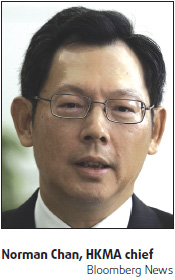Trouble if capital flows reverse: HKMA
Updated: 2009-11-20 07:43
By George NG(HK Edition)
|
|||||||
HONG KONG: The new head of the Hong Kong Monetary Authority (HKMA) has warned that a reversal in capital flow could cause sharp fluctuations in asset markets and hurt the local economy.
The continuous inflow of capital since early this year has sent local asset prices soaring, with share prices doubling from their lows in March and property prices surging.
Hong Kong's Exchange Fund, which is used by the HKMA to back the city's currency peg with the US dollar, benefited from soaring equity prices, posting a HK$71.9 billion investment gain for the third quarter, the de facto central bank said yesterday.
The latest gain easily beat the fund's HK$25 billion profit for the first half of the year, reflecting a sharp rebound from losses suffered in the first quarter.
The capital inflow is partly attributed to the so-called dollar carry trade, a practice wherein institutional investors borrow nearly zero-rate US dollars and invest them in higher yielding assets including local assets.
However, Norman Chan, the newly-appointed HKMA chief, warned of a potential reversal in capital flow yesterday when he briefed legislators on new developments in the financial market.

"While US interest rates are likely to remain low and the value of the dollar may also remain weak near term, these trends will ultimately reverse someday due to either rate hikes or a strengthening dollar. That scenario, once it happens, will trigger the unwinding of carry-trade positions which will cause fluctuations in asset prices, and therefore have an impact on the financial market and the real economy," the central banker said.
Aggregate capital inflow since October last year has reached a record HK$500 billion, he revealed.
The capital inflow - if it continues - may pose the risk of causing bubbles in the local asset markets, the central banker warned, noting that the price-earnings ratio (P/E) of the benchmark Hang Seng index has reached 19 times, compared with a historical average of 15 times.
Commenting on the sharp rise in prices of luxury property recently, which has resulted in the HKMA tightening its mortgage lending guidelines for banks, Chan said the banks' exposure to equity and property markets remains at "controllable" levels.
Chan also reiterated yesterday that the HKMA has no plan to change Hong Kong dollar's peg to the US dollar.
The peg has been contributing to the stability of the local financial system for over 20 years. There is no reason to abandon it, he told legislators.
The HKMA said yesterday the Exchange Fund's total assets stood at HK$1,958.3 billion at the end of September, up from HK$1,833.2 billion at the end of June, with the accumulated surplus increasing by HK$72.5 billion in the first nine months of the year.
In the first nine months, the fund made a HK$42 billion gain on Hong Kong equities and a HK$34.8 billion profit on non-Hong Kong equities. It also made a HK$6.9 billion gain on bonds and a foreign exchange profit of HK$13.2 billion.
(HK Edition 11/20/2009 page3)